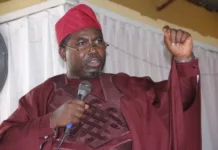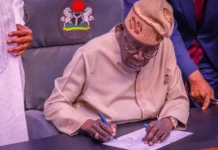‘Nigeria Needs Restructuring, Present Quasi-Unitary Constitution Unsustainable’ – Yemi Farounbi
“It is time we returned to the original regional autonomous structure, and establish a country where equity and trust reign. We firmly believe that the present administration has the historic duty to restructure this country“
A group, The Rebirth Group, has backed the renewed call for restructuring and accountability, saying the country would benefit from a return to the original concept of its founding fathers: autonomous regions.
In a statement by the Chairman of its Board of Trustees, Ambassador Yemi Farounbi; and convener, Owolabi Oladejo, the group said the present quasi-unitary constitution is unsustainable.
It said Nigeria requires a political governance structure with an equitable and inclusive power structure, a hybrid home-grown democratic governance structure with elements of the parliamentary system.
The group said it acknowledges that the process of restructuring Nigeria may exacerbate inter-regional and inter-ethnic tensions and conflicts at the initial stage as power dynamics and resource control shift.
It, however, said there is no doubt that “It will bring peace and progress ultimately” and that it was inspired by other heterogeneous countries that have developed suitable structures and systems that have led to peaceful, stable, and prosperous societies”.
The statement reads: “It is time we returned to the original regional autonomous structure, and establish a country where equity and trust reign. We firmly believe that the present administration has the historic duty to restructure this country.
“We should establish the modalities for reestablishing an autonomous regional structure, similar to what obtained in the 1959 Independence Constitution, but increasing the number of regions as dictated by current realities.”
Farounbi added that the Federal Government should first convene intrastate conferences by organizing ethnic nationality discussions within each state. The results of these intra-ethnic discussions, he said, should be subjected to a referendum to determine the preferred system of government favoured by the people, which state each ethnic nationality preferred to belong to and which region each state wanted to join.
He said: “Each region should have its constitution, outlining how it wishes to govern itself and how it intends to relate to other regions. This should be followed by inter-regional conversations to agree on a new Federal Constitution and to determine inter-regional relationships.
“The regions should subscribe to an inviolable Article of the Federation that will establish and preserve autonomy and guarantee liberty, equality, equity, and justice for each region.”
The group’s call for restructuring, according to Oladejo, became more pertinent because of the August 1 to 10, 2024 nationwide protest, which he added marked a critical moment in Nigeria’s history, as citizens chose to express their frustration and demand accountability.
He said what began as a peaceful demonstration, unfortunately, took a violent turn in some areas, leading to the tragic loss of lives. Additionally, some participants were also seen waving foreign flags and calling for a coup d’état.
Oladejo said: “This development is deeply worrisome. These actions could have serious and far-reaching consequences for the nation as a whole.”
He insisted that the idea of openly calling for external intervention or a military takeover was a serious threat to Nigeria’s sovereignty. He said: “Waving foreign flags deepens divisions within the country, sends a message that undermines our collective struggle for a better Nigeria, and could lead to increased polarization and heightened political instability.
“It could also harm Nigeria’s diplomatic relations, making it more difficult to garner international support for positive reforms.”
The group pointed out that the call for a military coup has historical consequences. It added: “The military coup d’état of January 15, 1966, gave birth to the Unification Decree 34 of 1966 which marked the beginning of a process that centralized power, abolished regional self-government, and destroyed federalism that was instituted by our founding fathers.
“The counter-coup of July 1966, which culminated in a devastating civil war and the subsequent military regimes gradually, sealed the fate of federalism through various constitutional reviews and decrees. Military interregnum led to prolonged periods of repression, human rights abuses, and economic decline, the effects of which are still felt today.”















